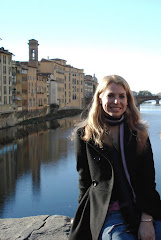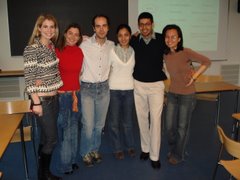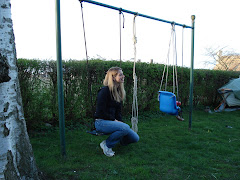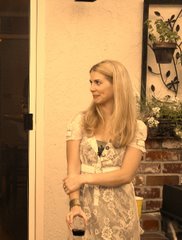
Recently, I've been fortunate enough to take some quick trips to France, Spain... and Sweden. That last country on my list doesn't really count ('no offense' to my Swedish friends), but the country is only a 30 minute train ride from Copenhagen, via the Øresund bridge connecting DK and Sweden.
In early March, I had my first Parisian adventure... and it was j'magnifique. (I don't speak a lick of French, so that is a completely made-up word, never to be uttered in the company of a francophile). I was there under the guise of "work," which means: a comp'ed hotel room, swanky dinners at Michelin star restaurants and lots of high-grade French wine, cognac and cheese.
 I highly recommend the following accomodations: Hotel Saint Germaine in Sector 6. St. Germaine is a bastion for all things culturally inspiring, religiously uplifting, and consumer-centric. That means, there are pretty churches, cool museums and great shopping! Literally, the shops rival the finest boutiques on Rodeo Drive, a formative place where I honed my shopping skills in the my late-teen years while at UCLA. I'll leave the museum critiquing to the experts...
I highly recommend the following accomodations: Hotel Saint Germaine in Sector 6. St. Germaine is a bastion for all things culturally inspiring, religiously uplifting, and consumer-centric. That means, there are pretty churches, cool museums and great shopping! Literally, the shops rival the finest boutiques on Rodeo Drive, a formative place where I honed my shopping skills in the my late-teen years while at UCLA. I'll leave the museum critiquing to the experts...I will, however, freely critique the level of friendliness and hospitality I witnessed in Paris, and give the city a 9 out of 10. Too many Americans (erroneously) believe the French are out to get us. We take to heart the criticism leveled at us by their more-vocal politicians over our foreign policy, which they may or may not find slimier than escargot. Regardless, it's unfortunate we take the comments so personally, and assume that when they speak of the war in Iraq, they speak ill of us. Or even worse, that they hate us. The French do not. Visit the country and see for yourself a population of passionate, honest, good-natured, loyal people with joie-de-vivre and a classic radiance that is all their own.
While in Denmark, I've had the privilege of befriending two French expatriates who live in Copenhagen. One of them (employed as a communications director for the UN) has been in Denmark for 4 years; the other one (working on her PhD in computer science) has been in DK nearly 2 years. After many fits and starts trying to learn danish, both have quit completely. Neither of them are capable of speaking or understanding much danish at all. What captivated me was how proud of this fact they are! The gentleman said to me, "Why do I need to learn danish? Everyone here speaks English!" I laughed at the irony. The woman also turned up her nose at the thought of trying a bit harder to speak danish. Apparently not all french people are averse to learning English, but they draw the line at danish. So, if you want to find a citizen of France who speaks perfect English... go to Denmark. (Please note the lower-case "d" in danish is the correct usage, according to the danes).
 Upon returning from France, I had the rare opportunity of hosting two close Sacramento friends, Penny and Alene. It was their first visit to Denmark, and they remarked how impressed they were to find such a clean, friendly country. We had a marvelous time together, even managed to squeeze in a trip to Malmö, Sweden. The photo (above) was taken in front of City Hall... (I think? My Swedish is a bit rusty, and I had trouble reading the signs).
Upon returning from France, I had the rare opportunity of hosting two close Sacramento friends, Penny and Alene. It was their first visit to Denmark, and they remarked how impressed they were to find such a clean, friendly country. We had a marvelous time together, even managed to squeeze in a trip to Malmö, Sweden. The photo (above) was taken in front of City Hall... (I think? My Swedish is a bit rusty, and I had trouble reading the signs).Last week, I spent several days in Girona, Spain… as part of a series of interviews with an American pro-cycling team, with a growing European contingent.
 They put me up at a lovely hotel in the Jewish Quarter (Ciutat de Girona), near the city’s main walking street – the Rambla—that runs parallel to the Onyar River. Girona is a very friendly and gracious city, with architectural style that mixes modern and classical. It is off the beaten path for most pedestrian tourists in Spain, which adds to its charm. The cycling industry (and the fact that Lance lived there for 5 years, along with many prominent Tour de France riders from various teams) has invigorated the city's appeal to tourists looking for a quiet, medieval town away from Barcelona (on the Costa Brava), and close to the border of France.
They put me up at a lovely hotel in the Jewish Quarter (Ciutat de Girona), near the city’s main walking street – the Rambla—that runs parallel to the Onyar River. Girona is a very friendly and gracious city, with architectural style that mixes modern and classical. It is off the beaten path for most pedestrian tourists in Spain, which adds to its charm. The cycling industry (and the fact that Lance lived there for 5 years, along with many prominent Tour de France riders from various teams) has invigorated the city's appeal to tourists looking for a quiet, medieval town away from Barcelona (on the Costa Brava), and close to the border of France.
Its citizens were warm and inviting—laughing whenever I broke into danish while stopping for directions or purchasing specialty chocolates (one of its famous Catalonian products). Girona’s centerpiece is the old quarter—where I stayed—which stretches out beneath ancient walls and watchtowers on a hillside on the east bank of the Onyar. Girona has a rich and glorious Jewish history in the Catalan region— even housing the medieval community of El Call, where the Kabbalah was first written down in España. I found the following excerpt: “For nearly 500 years, it lay buried, literally sealed off, as houses and streets were, in successive layers, built over it. Now in an ambitious restoration project, Gironans are digging down through levels of construction and back through centuries to unearth a part of Jewish and Catalan history that began at the start of the ninth century, ended at the close of the fifteenth, and then slowly faded from public memory until it was completely forgotten.” The expulsion of the Jews in 1492, and the Jewish diaspora that bookended such events—added layers to the city that could only cover up, and build on… its Jewish roots. You can still find centuries-old mezuzahs on the entrances into homes and businesses.
It is possible this recent field trips—and future pilgrimages to Spain—could initiate my own spiritual renaissance, if I choose to revisit those old feelings. (Those that I nurtured long ago… but have neglected in recent times, in favor of long runs & races. I’m speaking of faith, with such inelegance. Apologies!) In this season of Passover, I guess it’s a timely theme.
Knus, fra Denmark. XO.













No comments:
Post a Comment